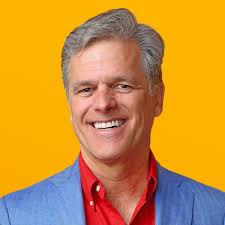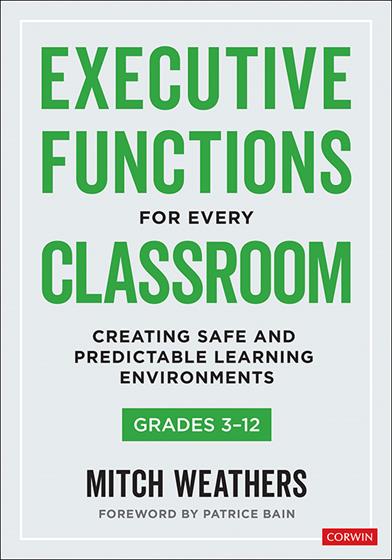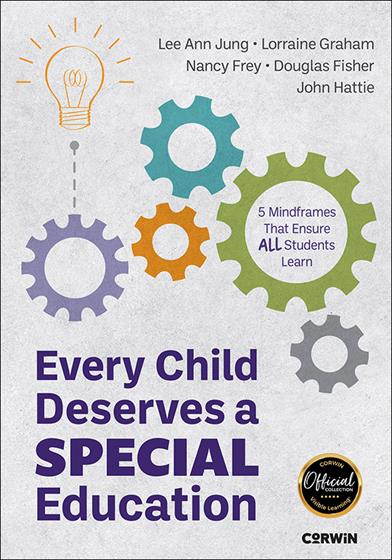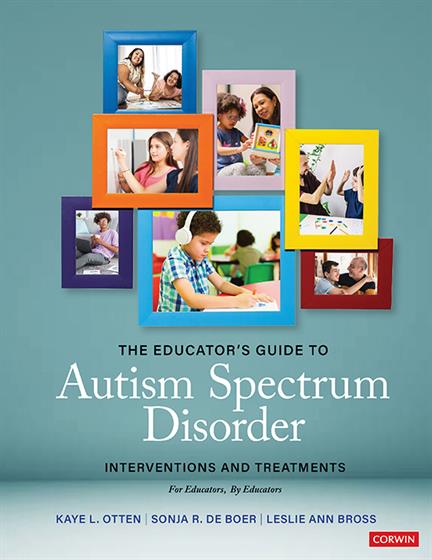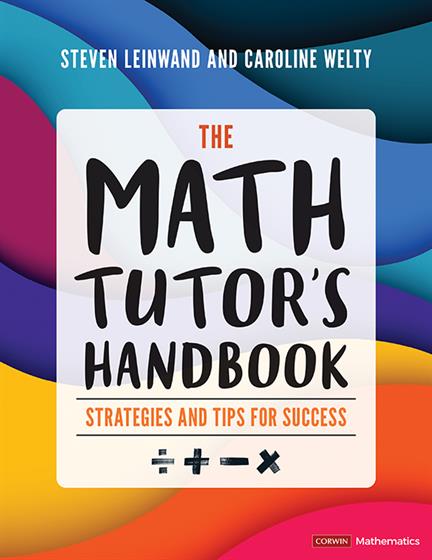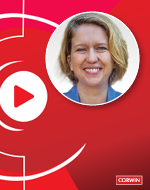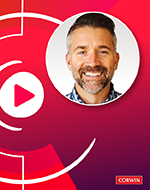NARRATOR: Welcome to Corwin's Leaders Coaching Leaders podcast with hosts Peter Dewitt and Michael Nelson. This
podcast is from education leaders for education leaders. Every week, Peter, Mike, and our guests get together to
share ideas, put research into practice, and ensure that every student is learning not by chance but by design.
PETER DEWITT: Michael, we have another episode of Leaders Coaching Leaders, and this one's a powerful one.
MICHAEL
NELSON:
It is, for sure. We've invited Tim Shriver, who's the editor of the call to unite and the author of fully alive and has
done so much with, as you know, Special Olympics, Peter.
PETER DEWITT: So going into this conversation, we're both a little nervous. I mean, Tim Shriver is a very big deal. And he does so
much profound work. What do you think, our listeners will get from this interview?
MICHAEL
NELSON:
Why, that is a great, great question.
PETER DEWITT: I pride myself on asking some really good ones.
MICHAEL
NELSON:
Well, that's just who you are. There's many quotes that he shares that he has a way of putting words together
into phrases that really resonate. And he talks about things that resonate not just in your mind and heart, but
really at the soul level. He talks about things at the soul level. And this podcast is a personal growth, but it's also
a call to action. So I mean, it's this huh, I'm personally impacted by the words that you're saying, but I can also
see leading in a way in which he's speaking. And I love the phrase that he used, everyone is more beautiful than
we dare imagine.
And that's what I'm talking about is like oh, he said that for me. I'm more beautiful than I dare imagine. But I can
also see that phrase used as I'm a leader, I'm a school superintendent, I'm a principal, and with my students and
staff, and everyone is more beautiful than I dare imagine. And those words speak at that level too. So that's what
I mean.
PETER DEWITT: Yeah, I think, before we jump into the interview, what we also want people to know is that he gives really
practical guidance. It's not just a lofty worldview, it's also the nitty gritty of what can happen within schools and
maybe the starting point for some of this work. And he uses some really key phrases about things like what
dignity actually means. And I think people will get a lot of-- they're definitely going to get that shared,
understanding piece that we always want them to have, but they're also going to get practical tips from him as
well. So we hope you enjoy this pretty wonderful interview with Tim Shriver.
MICHAEL
NELSON:
Absolutely. It's going to be great.
[MUSIC PLAYING]
NARRATOR: Picture yourself popularly known among staff members as the reliable go to person who makes meaningful
change happen. This is possible when you equip yourself with robust strategies and tools from Corwin's
leadership workshops. Sign up today at corwin.com.
MICHAEL
NELSON:
All right. Today we're joined by Tim Shriver. Tim, welcome to theL eaders Coaching Leaders podcast. We are so
glad that you're here today.
TIM SHRIVER: Thanks for having me. By implication, it sounds as though I'm a leader, so I'm flattered. But I'm a little
intimidated by the title and hope I can live up to it.
MICHAEL
NELSON:
You can certainly live up to it. We were talking just a little bit before we push record, and there's just so many
incredible experiences that you have had throughout your whole life. But just recently, in the last six months or
so, and we'd love to dive into that because I think many of our listeners may not know, but I'd love to start with
maybe a first connection of where I first met you.
I remember going to the AASA Conference in Nashville, and you were the keynote speaker, and you had just
published, edited the book, The Call to Unite. And it was just an incredibly powerful book to me with excerpts of
stories. And it was written during the pandemic and just so many incredible people. But I'd like to open just with
your words that are in the foreword, Tim, if you don't mind.
So over the course of my life, I've seen again and again, how people flourish when they unite and how they suffer
when they're separated. I saw it when I taught high school, where membership in a club helped my students
resist the allure of gangs. I've seen it in the movement for social and emotional learning, where kids who learn
empathy give up bullying for belonging.
I've seen it as chair of the Special Olympics, where athletes who have been isolated for their whole lives shine
with joy when they come together. But the most striking lesson I've learned about belonging, I've learned from
watching Special Olympic volunteers, including myself. Year after year, we come to help. We get humbled
because we think we're coming to serve the broken people. And we are the ones who are made whole.
I think those two paragraphs just I kept coming back to them. And as I think about the joy of having these 20, 25
minutes with you, Tim, the joy of you as a person. But this-- the people listening are the leaders of education in
the future. And this book came out during the pandemic and I have so many questions around it. But my first is
share a little bit about that quote, number one. And then I have a perspective that I read the book during the
pandemic and the passages that of hope during that time. But when I reread it recently, I think it's a book postpandemic.
You can learn so much more, even though it was written for a purpose, after. So I'll just let you
respond.
TIM SHRIVER: Well, thank you. Thanks for sharing that piece. The words of in that essay, they were, I was trying to write there,
Michael, about this issue that is, as you point out, post pandemic. It's now cultural. This issue that we're so
divided from one another. That we seem to be so different that we can't bridge the gap. That it looks like a
bridge. It's just a bridge too far to find a way forward together for many people.
And so this descent into a certain loneliness, a certain anxiety about the future, a distrust of others, of
institutions, of organizations, of groups of people. It all seems inevitable to so many of us. And it isn't. It is not
inevitable. And it partly is driven by the story we tell ourselves about each other. We say Republicans are so
horrible, or Democrats are so horrible, or people who live in the South are so horrible. People who live in the
North, Oh my God, they're just the worst. And the list goes on and on. Those people. And it's not true.
So many times our view of others has been distorted by the media, by the news, by the algorithm. And we've
come-- we create this specter of another human as being so distasteful or contemptuous that we can't get along.
And what I found in Special Olympics, I mean, people don't automatically make the leap, but it's there. This is a
population that was treated that way for centuries. They're just too different. You got to get rid of them.
And all it has taken for most of us is just a meeting, just to see each other for a glimpse. It doesn't erase that.
You have down syndrome and I don't, or that you have autism and I have something else, or that you have
prado-- I mean, all those conditions can persist that make us different. But they do not have to contribute to
hatred and contempt. They can actually awaken us to a deeper form of respect and dignity and even love.
So the difference making, the leading US from difference to contempt is the problem. And the book, in so many
ways, I was saying to you before we started, I just interviewed yesterday for my podcast for Need a Lift, which is
all just profiles of people who look the face of pain and difference and find a way through it with hope and
possibility. I was interviewing Reverend angel Kyodo Williams. She's a zen priest and a social activist. And most
people say, well, you have to be one or the other because the zen priest just sits around doing zen all day long,
and a social activist is out pounding the pavement. No, you don't have to do one or the other.
And in the book, The Call to Unite, in the midst of the pandemic, her advice was take a moment to look up at the
sky. What she was trying to say in the book was, take a breath, humanity. We're going to be OK. Even those of us
who may suffer more deeply, we will find a way through if we have space within ourselves to see ourselves as
part of this huge, big narrative like the sky tells us we are. And that's what she was saying yesterday when I
interviewed her, but with much more grit and toughness around how you can be both whole and peaceful and
whole and a peacemaker, and at the same time, challenge systems that don't work in ways that are full of love,
not full of contempt, not full of anger.
So I think the prophet Isaiah is one of my favorite quotes in the Judeo-Christian canon, when the prophet writes
about people being charitable, giving your cloak to those who need it and visiting those in prison and helping the
sick and so on and so forth. At the end, the language is you will be known as a healer of the breach. And I think
that's the challenge of this moment, the superpower we need as leaders is to find ways to heal breaches because
they're all around us. And if we don't heal them, I'm sorry to say, I don't think we make it
PETER DEWITT: Thank you. And I'm going to get a little bit more personal than I expected to when we first started this podcast.
So Michael and I wrote-- write the Finding Common Ground blog for Education Week. So we're always looking at,
we want to make sure that we're focusing on how we can come together as opposed to how we can rip each
other apart. But even in the past couple of years, I lost my mom and sister four months apart. And I have a
couple of brothers that are on the other side of the political realm than I am, but I always feel I don't have the
luxury to not talk to somebody because they have a different political view than me.
Well, we have to start with is how do we come together and what are those things that we do have common
ground on. What are those conversations that we can have? And these challenging conversations don't have to
be difficult. We do it all the time when we're coaching leaders. It's how do you start with difficult conversations
and just make sure that you're asking the right questions and you're trying to get the entry point into the
conversation with what they're believing? I know that listening is something that's really powerful for you.
I want to go back to the Special Olympics piece, and I have to do a shout out because I have two very good
friends. I live in upstate New York. I have two good friends, Peter Marsh and Peter Slattery. So yes, there are
three Peters together. We make it easier for everybody to just know our names, but they are heavily involved
with Special Olympics. They coach tennis. They're a part of the state. When everybody comes together across
the state. And I've volunteered for tennis when the competitions have been in the area.
And one of the questions, I actually texted Peter this morning and said, I'm going to be talking to Tim Shriver
today, so I need to know what is a good question. So I'm going to give him credit because it comes from Peter
Marsh. But he said, how do Unified Sports and Best Buddies, how do these programs affect education for
students, coaches, and the broader school community?
TIM SHRIVER: Well, I'll try to answer that briefly. But first of all, let me say extend to you where I'm sure a lot of listeners are
feeling, which is our condolences for your loss. It's losing a sibling is brutal. I haven't had to do that. Thank God.
Losing a parent is brutal. Losing two at the same time, I can't imagine so. I'm extending to you the sympathies of
all of us listening, as you, I'm sure, continue to navigate that.
Maybe the answer to Best Buddies or Unified Sports, which is Special Olympics sports, where children with and
without intellectual challenges are on the same team together. Maybe the answer is a little bit in your intro,
Peter. These programs allow people to meet one another on common ground. I like to say the formula for the
Special Olympics, which has been around for 60 or so years, depending on how you count, based on my mother's
formula, was meet, play, celebrate, repeat.
There's 50,000 Special Olympics games a year. They all have the same formula. People meet, they train or play,
they compete using whichever word you like, and then they celebrate the good in each other. They don't meet
and then make a list of all the ways in which they're different. They don't meet and do a diagnostic of their
genetic or biological symptoms. They meet and they play.
And they after they play, they don't go, you suck, I'm good. They celebrate. I came in first, Yay. You came in
second, good for you. Did you do the best you could? Could you do better next time? Then, let's do it again. This
is a deceptively powerful formula for bridging divides maybe within your own family. You don't have to meet your
brothers, but maybe you do have to play a little bit with your brothers. And whatever form that play might take
joke telling, watching sports, playing charades, playing football. I don't know what it might be. It could be any
number of different things.
But the idea that we come together and then we enter into some kind of a relationship that brings us common
ground, common experience. For kids, this is wildly natural. So kids join Best Buddies in third grade or sixth
grade, or they play in a Special Olympics Unified soccer team in third grade or eighth grade or 12th grade. You
almost don't have to teach them. They know, I'm just going to play soccer. Everybody knows what to do. You
don't use your hands, you kick the ball, you try to score a goal, or you run up and down the field.
And before it, you've become a part of the other person's team. And before it, you look over across and you don't
see Peter Dewitt, the expert, you just see a fellow soccer player. You see a teammate. And that seed's-- like, I
think that settles into your consciousness, into our collective consciousness. You see that person as having that
identity. And as one of our Special Olympics athletes said to me years ago.
When I went to Special Olympics, I was no longer-- and I'm going to use the language she used because it was a
long time ago, I was no longer retarded, I was a runner. And we have a lot of conversations these days about
identity. Like, what's your identity? What's my identity? They are, in some ways healthy, in some ways
complicated. But for someone who's had an identity that always pushed them out of the circle of belonging to get
a new identity that centers them in the circle of aspiration and inspiration, it can be life changing.
So for kids, we think this is critical and we see gains in academic achievement when kids join Unified Sports. We
see gains in attendance. We see gains in mental health status. Because I think it liberates them to see
themselves as part of the larger whole. And we all, like I said in the introduction that Michael read, we think-- you
say to fifth grade, I asked a fifth grader just a couple of weeks ago who was a non-disabled person volunteering
in a Unified Sports team and in gym class. He said, well-- I said, why do you do this? He said, my mom told me I
should.
And then I said, well, what about you? He says, Oh, yeah, I like it a lot because I get to teach my friend. I think
his name was Ralph. He teach Ralph how to play football. So if Ralph ever wants to play, he'll know how. And
then I said, and is there any-- what have you learned from Ralph? And he looked at me and he said, oh, he said, I
learned that we all need to help. He didn't say, I learned I need to help. He learned the lesson that everybody
needs to be a helper. Fifth grade.
Now, if you ask me what he's going to remember at 30, he's going to-- I think he's going to remember what Ralph
taught him when some issue confronts him. And I think it's going to make him a better math student and a better
science student and a better citizen and a better kid and a happier human being.
PETER DEWITT: Well, I think I have to agree with you on that one, because I'm a former teacher and school principal, and
volunteering with Peter and Peter for the Special Olympics is just life changing when you're there. So thank you
for that.
MICHAEL
NELSON:
I couldn't help but think of the word dignity as you walked your way through that. And in the first question I
heard you use the word contempt. And you and your colleagues have worked tirelessly on a new project in recent
years called the Dignity Index. And I think our listeners are educational leaders who are tuned in, and other
leaders who are tuning in to this podcast may or may not know about it, but it really impacted me when I began
to study those two words contempt and index-- contempt and dignity.
And the use of the word dignity, there's almost this calming sense every time I say it, and I have no idea why
that is for me, but I would love to know a little bit more about that. The index and just that continuum from
contempt and dignity.
TIM SHRIVER: Well, here, here's what this-- here's a couple of quick points. When we looked at the culture-- at our broader
culture surrounding our schools, we concluded-- this is a few years ago, we did quite a big outreach and did a lot
of polling, and we did a lot of visits, talked to a lot of kids, talked to a lot of politicians. And so on. Our little team,
concluded that we don't have a difference of opinion problem, that we have a contempt problem. It's not that we
differ. We do differ. And we always will differ. And we always have differed. Differing is not the problem. It's how
we treat each other when we differ that has become a problem.
So we refer to that as contempt. We treat each other with contempt when we disagree, which means at some
level we think they're less human than we are. We think those people are less than we are, and dignity is seeing
in the other person the same as me, I see myself in you. Now, if that's the problem, if it's not that we differ on
immigration policy or economic policy or tax policy, whatever it is, those things are important, don't get me
wrong. But if those aren't the problem, if the problem is when we disagree, we treat each other with contempt,
then we've got a new issue. And that is how do we reduce contempt and increase. On the other end, dignity.
So we built a scoring tool so we could in a way frame the problem for people. You can see yourself from 1 to 8.
It's an objective tool. You can score yourself. It's not actually very complicated. We thought at the beginning, oh,
no one's going to accept that they're treating someone with dignity or with contempt. Actually, people own up to
it pretty much right away. As soon as they see it, they see the language of a two is you're ruining everything and
you're evil and I'm good. And they go, oh yeah, I use that yesterday. OK, that's a two. And then they see
themselves saying, well, I think Michael should have equal time. We don't agree on things, but give him equal
time. Oh, that's a five. Oh, yeah. I used a five when I was talking to him yesterday.
So the scale allows us to see ourselves and to see others on a continuum from one, which is you don't deserve to
live to eight, which is, no matter what, I see myself in you. What's happened, Michael, is that teachers and school
administrators, school board members have been one of our big audiences because they're trying to create
dialogue at school board meetings that has dignity and respect as part of it. So you can use the index and say to
people, hey, when you raise your hand and you want to talk to a school board member about a decision, you're
not-- use five and up language.
And the person can look at it and go, what the hell is that? And they can look at it and go, OK, I can disagree, I
can be principled, I can be passionate, but I cannot use hatred and contempt towards you, the school board
member. That's off limits. So it has become a tool for creating codes of conduct. Some teachers are using
teaching the scale in classrooms and then using it for instance, to help kids get into reading the speeches of
great politicians or reading the characters in a short story.
And how did-- what was-- when such and such talk, when Hamlet uses this language or when Boo Radley says or
doesn't say this or that, or the other thing, how would you score his speech or their speech in the piece of
literature? So it's moving into the classroom. This is being done by teachers, by the way. We don't have all the
tools for teachers to do this. We're offering it to teachers and inviting them into a collaboration.
But the exciting thing is that it has enabled conversations around the issue that we think is destroying us. And it
invites people to recognize the problem of contempt, their role in it, but most importantly, their power to change
it. Because so many people feel like, oh, what are we going to do? It's a hopeless case. The country's going to hell
in a handbasket. I don't want to deal with those people, whatever we think those people are. My team lost or my
team won. My team won, we're going to crush them. My team lost, I'm going to give up.
That cycle is, I would argue, not American. That's not who we are. That's not what's made this country good at
the times when it's been good. And it's also not the quality that's gotten us through the times when we've failed
each other. Giving up is not cynicism, and despair is not-- we can't-- this country doesn't work on those. And I
think contempt is at the heart of the cynicism and despair in the country and amongst many of our kids and our
families.
So we hope this little tool, it's a one pager. It's like I know from being a teacher, you want to me to read a book
about how to teach something. Forget it. I don't have time for that. But give me a one pager that I can introduce
into my third grade or my sixth grade or my 12th grade classroom, I'll take a look at that. And so teachers have
been terrific. And schools are, I think, showing in baby steps now, but we hope in more aggressive
implementation in the future, ways in which we can address some of the challenges our kids face and our
communities face around this issue of treating each other a little bit better.
PETER DEWITT: So I'd like to actually try to bring two things together. Hopefully I'll be able to do it as I'm talking. So we know that
over the years, the past few years, especially school administrators have really had to deal with a lot. I mean, so
have teachers, but school administrators, district administrators, we know that we've constantly talked about
principal attrition because of the political stuff that's going on. And when we think about the fact that there are
community members and family members, that actually would be more likely to believe a news station than they
would their administrator within their own school like that.
A few years ago, talking about critical race theory, and there were just people that this is going on in the school
when it wasn't happening in the way that they were thinking. But there they were actually believing a national
news station more than they're going to believe what's going on in their school, which is a problem, I think, for
schools. And then we start thinking about things like shared understanding. That's something Mike and I talk
about when it comes to dignity.
What do you think? You said that this isn't necessarily. You don't have the tools yet for teachers. And I'm going to
say the word yet. But what would be the first step for school administrators and district administrators who are
feeling really overwhelmed by being in the middle of all this discourse, when it sounds like the dignity Index is a
really great space to define that shared understanding. What would be the first step?
And I know I'm making it really intentional here, but we've worked with so many school leaders that just
constantly struggle with where do we start? Where do we start? Do we really need one more thing? We have so
many initiatives. We're doing all these things. Where is the place they could start where this work?
TIM SHRIVER: Yeah. Well, it's a great question. And as usual, I wish there was like when it comes to what I would call the
science of implementing anything in a school, it's complicated, but I'll try to make it as simple as I can. And I just
got off a call yesterday. Day before yesterday with a superintendent in a Connecticut School district who wants to
be the model district in this. So I'll tell you what he said. He said the first thing I'm going to do-- I said and I said to
him, you have so many initiatives. We don't want to add another initiative. He says yeah, we're going to do an
inventory and find out where this fits within the existing work we're doing.
So the first thing he was almost saying, I've done it or I will do it, is get an assessment of where you are now,
what you've got that's working in this area, in the area of dignity, and empathy, in the area of self-regulation, in
the area of communication, relationship skills, all those things, all the SEL frameworks. Find out what you've got
that's closely aligned to this. And the reason you'd be asking that question is because maybe none of them yet
highlights this one issue. And we think this one issue, treating each other with dignity, can become a lever that
pulls or pushes all those other initiatives along. So find out where it might fit.
Secondly, what he's going to do is he's going to appoint a group of teachers to work with us and get training. And
training can be an hour. It can be half an hour or it can be three days, but it can be an hour. And you can learn
quite a lot about how this works in an hour. He wants those 6 to 12 teachers, he hasn't decided, administrators
and maybe a pupil personnel person also, to form a small committee that will look at an implementation next
year in an elementary and middle and a high school. And he wants classroom implementation. He doesn't want
just planning or structures or policies or parents or, he wants them to think about how dignity can become a part
of the classroom culture in his school district.
He's going to appoint a separate person to work with us on discipline and on peer mediation, restorative
practices, and discipline, because he thinks that his administrators could use the Dignity Index to better dialogue
with kids. When kids have been found to violate a school norm that requires some kind of discipline. Then there's
going to be a third phase, which is going to focus on how do we get parents to become a part of this, and how do
we make this accessible to parents? Because it's no good to teach a third grader how to dialogue with dignity if
the parent at home, the parent models a huge amount of contempt or anger or hostility towards the kid, or
towards anybody else for that matter. So it's not that we're telling people how to behave, it's just that we're
giving them the tools to opt up.
So that's how he's thinking about it. My own view on when you want to change a school district or change a
school or help a school or support a school, and what it's trying to do, is it-- yes it often starts top down. Get a
principal, get a superintendent who cares. That makes it safe for everyone else. But the real change takes place
when classroom teachers see value for their classroom-- for their kids.
And I think we can show value for this-- for almost any age group without a huge amount of disruption, without
back breaking levels of implementation and rigor, but with a kind of a guided support that just allows people to,
as I say, it's almost as simple as saying we have a new issue class this year, second grade. I want you to know,
we have one belief in this class that I want you all to learn, and we're all going to try to model, and that is that
when we disagree, we're going to treat each other with dignity. And does anybody know what dignity means?
And then one hand goes up. No hands go up. OK let's write on the board what dignity means. And then let's get a
definition for our class. I mean I'm now I'm teaching it, but it's probably not what you want. But this is what
excites me.
PETER DEWITT: We're former primary school teachers. So you are like, speaking our language right now.
TIM SHRIVER: But it excites me. And then when you have circle. And when you have literature, or when you have a breakdown,
or when you have a bad day, or when something happens and people are scared and they're scared and they
think they want to blame someone, we can use this language as a way of incorporating your fears, your anger,
your hostility into strategies that actually optimize the need to work through those things without resorting to
dehumanizing contempt as the way to manage them. Does that make sense? I mean, this is all work in progress.
So I just wanted--
PETER DEWITT: No, it's beautifully said. So thank you for that.
MICHAEL
NELSON:
It's fantastic. And for me, if I were to add my two cents and offline, I would love to know who this person is and
connect with them because I would love to follow their journey as a former superintendent. The actions and
behaviors of the superintendent and the board of directors. That's what ripples. And that's what's talked about in
the produce aisle of your grocery store. If something goes, if something goes in a way that's not dignified, that is
not on the dignity end of that.
And so even though I know you talked about the importance of the grass roots of the student, I think the
modeling at a school board meeting and putting even those words into policy and having a poster on the side of
the room where the board is talking, it has the dignity scale. And you say those words before public comment
each and every time. And that's modeled over and over again. That's going to ripple differently throughout the
system.
TIM SHRIVER: I think so. And the good news is, people say, are you going to be thought police or constraining free speech?
Absolutely not. And the good news here is that people are starving for a way out of this feeling of hopelessness
and anger and hostility. No one's-- I mean, very few people are happy when they feel divided and completely
alienated from their brothers or their family or their community or their other parts of the country. No one wants
to be here. I mean, many people feel like they have no choice, but they don't like it.
So they're looking for an alternative. And, we always say to people, we don't-- the biggest threat to free speech,
I'm just going to anticipate a question, are you telling people they can't say what they want? No. The biggest
threat to free speech today is not the government, it's contempt. If I said to you guys in the last month, have you
been in a situation where you have thought something and not said it? If I ask an audience that every hand goes
up, yes, I have.
And the reason you haven't said it is because you're afraid of how you'll be treated by the other person in the
room. If you say it, you're afraid of the contempt and the dehumanization that will come if you ask the question
the wrong way. If you say you don't agree with some conventional wisdom from your group. So we are selfcensoring
more than ever because of our fear of each other. If we can create settings where you don't have to
worry about being treated with contempt because you ask a question, all of a sudden you get to be Michael or
Peter or Tim, and you get to actually learn and grow without fear.
I mean, isn't that what teachers are supposed to be aspiring for? Everybody always says that no, there's no
stupid questions. Raise your hand. But kids start to learn. Well, actually, there are stupid questions. There are
questions you could get punished for because they see adults saying, there are questions I will get punished for.
So we think this is a great tool, not just for making people feel better, but actually for opening conversations--
excuse me, for opening-- sorry. For opening dialogue and making it more healthy and authentic to bring our real
questions to the conversation and our principles to the conversation in a way that doesn't make us all more
hateful.
MICHAEL
NELSON:
Well, this time has flown by, and I think we have just one little type of closure. And I know I read a little bit from
the book A Call to Unite. And I'd like to close in a final question with your book, Tim,F ully Alive. And it comes
from chapter 6, and it's actually the beginning quote of the chapter from Maya Angelou. We awaken on a low
plane, on a plane of defeat beneath the level of possibility, overpowered sometimes by a general climate of
hopelessness. Kind of what we just have been talking about. Promise can be viewed as unattainable and into the
morass of misery.
A light shines, a light enters into the atmosphere of gloom and despair, daybreak's, light emerges, flooding the
grim meadow of misery with hope and promise. Light. And the name of the chapter is called daybreak, and the
focus of the chapter is a monumental day of July 20, 1968 with Special Olympics in Soldier Field in Chicago. And I
can't imagine what your mom felt on that day. I feel like I can feel some of her feelings from that day, which is
often known as daybreak.
And it's a feeling of hope for the future from-- I'm sure you wish sometimes that she were still alive and that
could just see and feel what was started on that daybreak break. And as our leaders are listening right now, I'd
love to know, ending with hope. So--
TIM SHRIVER: Yeah. Well, I appreciate your--
MICHAEL
NELSON:
--heart of hope [INAUDIBLE]
TIM SHRIVER: My mom trusted her heart a lot. And you have to have if you were a mom or a sister or a brother of a person with
an intellectual disability growing up in 1920 or 30 or 40. The world was cruel, brutally cruel to people with
intellectual disabilities in that era. And so she had to know somewhere outside of everything the world told her
that all that was wrong. And I call that the soul level. That's where Maya Angelou writes. She writes at the soul
level. And we all need that level. My little leadership framework is leaders help us find our goals, our roles and
our souls. It's easy for me to remember. That's how come I use it.
Leaders help us set the goals so we know where we're headed. They help us know our role so we know our part
in achieving the goal. But they also tap into our deepest level, our soul level. And that's what schools do at their
best every day. You wake up and you think to yourself, my work matters to me at the deepest level of my-- I
know you're trapped in grading papers, and I know you're trapped in lesson plans, and I know you're trapped in
trying to get technology to work and all these things. But most of us went into education because at some level,
we loved kids. We wanted to help make the future better. We believed that we could make a difference. That's
the soul level.
And when we unleash that level, that's what my mom did on 1968. And she trusted her soul long enough to say, I
will not allow the beauty of this group of human beings to be crushed any longer. Even if it's just me and 10 other
people or 500 other people, we are going to celebrate the beauty of these people. We can see it. Let the world
see it with us. And now, 200 countries, 50,000 times a year, those games are run.
Community in the dirt roads and Central Africa and Middle schools and urban New York and Russia and China and
Syria and Lebanon, those games are being run every day of the year. Every one is a protest against exclusion
and fear and dehumanization. Every one of them is an invitation to see our brothers and sisters with dignity and
to be healers of that divide.
So I'm just obviously, super proud of my mom, but I'm also super grateful to be in this work, as I dare say, as an
educator, I'm not in a school, but I do count myself as an educator. I try to be a leader, but most of all, I try to
trust that everybody is more beautiful than we dare imagine. And if as educators, if we can keep that central
experience, that central belief with strongly in front of us, I think we can get through a lot of these difficult times
we're in right now. And I know they're difficult, but if I had to bet on any group of people, I'd bet on our educators
to get us through.
PETER DEWITT: Tim Shriver I mean, I'll speak on behalf of Mike. Thank you for powerful conversation. And that was a beautiful
way to end the podcast. So thank you very much for being on our Leaders Coaching Leaders podcast.
TIM SHRIVER: Thanks for having me. Thanks you guys.
[MUSIC PLAYING]
MICHAEL
NELSON:
Well, Peter, and listeners, I hope that you just enjoyed the last 30, 35 minutes of just a lesson for yourself and a
lesson in leadership. Wasn't it just amazing, Peter?
PETER DEWITT: It was. I have to be honest. Sometimes you go into these and you're just like, OK, we're supposed to keep this at
20 minutes, or we're supposed to keep this at 25 minutes because maybe the attention span isn't what it once
was. But you can't do that when you're having such a deep conversation about so many important topics that
people need to know. And that's what he did. He makes it so easy--
I mean, let's be honest here. We know his background. We know his family. We know there's just so much that
can come with that name Shriver. And yet he as soon as you come in and start to have a conversation with him,
he's incredibly personable and he makes you not feel-- I mean, he's really the epitome of what he was talking
about, which is it's not about his status that he's bringing in. It's about giving all three of us in the conversation
equal status. And I think just that alone is a really important part for people to think about.
How do you as a leader or a teacher or an instructional coach or whatever, a superintendent, whatever your
position might be, how do you do what Tim just did with us? He comes in with a huge level of status, and yet he
made us feel like we were all equal because he truly believes that we're all equal. And I think that's a powerful
sentiment to always make sure that we live by with whatever population we're working with, if that makes sense.
MICHAEL
NELSON:
Well, no, you just described what he shared. We met, we played, we interacted. And it was so good. So he really,
as you just described in that 30 minutes together, we met, we played, we celebrated. And the path of what
Special Olympics is and how-- he could talk just fundamentally about Special Olympics, but he talked, what do
Special Olympics mean for the culture of the world? It speaks of belonging. It speaks of inclusion. It speaks of
dignity. That's what it speaks of.
So that event on July 20, 1968, which he talked about the day. Well, we all know that was the event in Soldier
Field. And that's where most people say that's when Special Olympics started. But we all know it was in his
backyard and his mom brought everybody to the backyard. And that's really when Special Olympics started. Play
day at the Shriver backyard. And that's the story. That's the story behind the story.
I think most of the world thinks of what that day as Daybreak, July 20, 1968. But really there's something more,
which is the soul of what he was talking about that his mother knew. And I think as educators and the people
listening you know you're doing good work. You're doing soul work right now. Don't give up. Just keep moving.
Have hope.
PETER DEWITT: Yeah. And I think the other piece of the dignity piece, I brought up losing my mom and sister and not having the
luxury to think always about politics when it comes to family because my family is incredibly close. We just might
always have different political views. And I think one of the things that you made me think of that he made me
think of too, is that idea of legacy. When it's all said and done and you're looking back, how did you treat other
people who may have disagreed with you? Did you waste a lot of time scrolling social media to just get angrier
about something. Or did you actually move into a space where you wanted to create deeper relationships with
people, no matter who they might be?
And those are the topics I think about because I've been feeling we're recording this around the times that the
holidays are happening or just happened, and I've been feeling like there's got to be this bigger space that we
need to focus on, as opposed to getting caught up in the little things that might irritate us or the little things we
disagree on. I feel like in my personal life, it's about finding the things that we agree on because I want the exist--
I want my existence to be better. I don't want to focus on all these things that I can't control. I want to focus on
the things that I do. And that's been part of this conversation as well.
MICHAEL
NELSON:
Yeah, absolutely. And we did talk about, excuse me, the continuum of contempt and dignity. But I guess what I
would like to point out is, there was no contempt when you and he were talking about your mom.
PETER DEWITT: No.
MICHAEL
NELSON:
So what he did was taking dignity to a new level because if you were to play back that interview, he spent at
least 30 to 60 seconds not just giving you condolences, but talking to you about that. And so he took-- it's almost
like a lesson in dignity plus. So that we are in agreement with and that we are-- our siblings, our family, that we
are in agreement. It's them-- he just modeled the importance of taking a moment. He's in the middle of a podcast
and you share that. And he spent a, I would say it's probably a good minute. And that was pretty amazing too.
PETER DEWITT: Well, Michael, you were the one who actually brought Tim Shriver to the table and said, let's-- do you think we
can get an opportunity to interview him because you had seen him present, like you said, during the podcast.
And also, he spoke to us when we were both working. You were working with WASA, and I was working as a
consultant with WASA. So thank you for bringing him to this moment where we could have a deeper conversation
and ask him some deeper questions. As for everybody, if you enjoy the podcast, please let us know. Not only can
you listen to it, but you can actually watch the video on YouTube as well if you're not watching it there. So
Michael, another great interview. Thank you.
MICHAEL
NELSON:
Well, thank you, Peter. It was great, and I hope our listeners enjoyed it.
[AUDIO LOGO]

